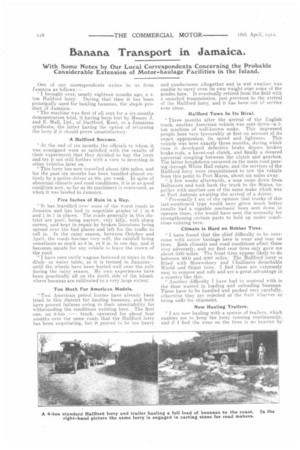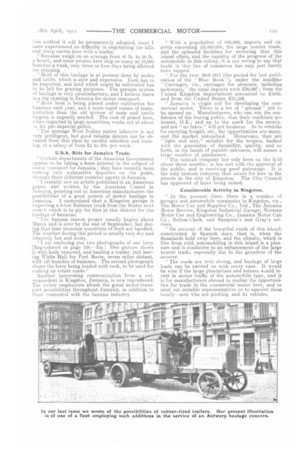Banana Transport in Jamaica.
Page 4

Page 5

If you've noticed an error in this article please click here to report it so we can fix it.
With Some Notes by Our Local Correspondents Concerning the Probable Considerable Extension of Motor-haulage Facilities in the Island.
One of our correspondents writes to us from Jamaica as follows :— " I brought over, nearly eighteen months ago, a 4ton HaIlford lorry. During that time it has been principally used for hauling bananas, the staple product of Jamaica.
"The machine was first of all sent for a six-months demonstration trial, it having been lent by Messrs. J. and E. Hall, Ltd., of Dartford, Kent, to a Jamaican syndicate, the latter having the option of returning the lorry if it should prove unsatisfactory.
A Hanford Success.
"At the end of six months the officials to whom it was consigned were so satisfied with the results of their experiment that they decided to buy the lorry and try it out still further with a view to investing in other vehicles later on.
"This lorry has now travelled about. 4200 miles, and for the past six months has been handled almost entirely by a native driver at 30s. per week. In spite of abnormal climatic and road conditions, it is in as good condition now, so far as its machinery is concerned, as when it was landed in Jamaica.
Five Inches of Rain in a Day.
"It has travelled over some of the worst roads in Jamaica and has had to negotiate grades of 1 in 6 and 1 in 7 in places. The roads generally in this district are poor, being narrow, very hilly, with sharp curves, and kept in repair by broken limestone being spread over the bad places and left for the traffic to roll in. In the rainy season, between October and April, the roads .become very soft, the rainfall being sometimes as much as 5 in. or 6 in. in one day, and it becomes unsafe for any vehicle to leave the crown of the road.
"I have seen cattle wagons fastened at times in the ditch—or water table, as it is termed in Jamaica— until the wheels have been buried well over the axle during the rainy season. My own experiences have been practically all on the north side of the island, where bananas are cultivated to a very large extent.
Too Much For American Models.
"Two American petrol lorries have already been tried in this district for hauling bananas, and both have proved failures owing to their unsuitability for withstanding the conditions existing here. The first one, an 8-ton — truck, operated for about four months over the same roads that the Hanford lorry has been negotiating, but it proved to be too heavy and cumbersome altogether and in. wet weather was unable to carry even its own weight over some of the grades here. It eventually retired from the field with a smashed transmission, just previous to the arrival of the Hallford lorry, and it has been out of service ever since.
Hanford Tows In Its Rival.
"Three months after the arrival of the English truck, another American vehicle was sent down—a 3ton machine of well-known make. This impressed people here very favourably at first on account of its smart appearance, its speed and lightness. This vehicle was here exactly three months, during which time it. developed defective brake drums, broken brake-rods, a burnt-out clutch, and finally a sheared universal coupling between the clutch and gearbox. The latter breakdown occurred on the main road passing through White Hall estate, and the services of the Hallford lorry were requisitioned to tow the vehicle from this point to Port Maria, about six miles away.
"A few weeks afterwards, a man came down from Baltimore and took back the truck to the States, together with another one of the same make which was at Port Antonio awaiting the arrival of a driver. "Personally I am of the opinion that trucks of this last-mentioned type would have given much better results had a capable mechanic been sent down to operate them, who would have seen the necessity for strengthening certain parts to hOld up under conditions existing here.
Climate is Hard on Rubber Tires.
"I have found that the chief difficulty to be overcome with motor haulage here is wear and tear on tires. Both climatic and road conditions affect these very adversely, and my first rear tires only gave me about 3000 miles. The front tires appear likely to do between 5000 and 6000 miles. The Hallford lorry is fitted with Shrewsbury. and Challiners detachable World and Giant tires. I find these are extremely easy to remove and refit and are a great advantage in a country like this. " Another difficulty I have had to contend with is the time wasted in loading and unloading bananas. These have to be handled and packed very carefully, otherwise they are rejected at the fruit wharves as being unfit for shipment.
Now Hauling Trailers.
"I am now hauling with a system of trailers, which enables me to keep the lorry running continuously, and if I find the wear on the tires is no heavier by this method it will be permanently adopted, since I have experienced no difficulty in negotiating the hills and sharp curves here with a trailer.
" Bananas weigh on an average from 40 lb. to 60 lb. a bunch, and some estates here ship as many as 10,000 bunches a week, only three or four days being allowed for shipping.
Most of this haulage is at present done by mules and cattle, which is slow and expensive. Corn has to be imported, and land which might be cultivated has to be left for grazing purposes. The present system of haulage is very unsatisfactory, and I believe there is a big opening in Jamaica for motor transport.
"More land is being placed under cultivation for bananas each year, and a more rapid means of transportation than the old system of mule and cattle wagons is urgently needed. The cost of petrol here, when imported in large quantities, works out at about is. 6d. per imperial gallon.
"The average West Indian native labourer is not very intelligent, but good reliable drivers can be obtained from this class by careful selection and training, at a salary of from £1 to 30s. per week.
U.S.A. Bids for Jamaica Trade.
Certain departments of the American Govermnent appear to be taking a.keen interest in the subject of motor transport for Jamaica ; they have recently been making very exhaustive inquiries on the point, through their different consular agents in Jamaica.
" 1 recently saw an article published in an American paper, and written by the American Consul in Jamaica, pointing out to American manufacturers the possibilities of a good _system of motor haulage in Jamaica. I understand that a Kingston garage is importing a. 3-ton Reliance truck from the States next month which is to ply for hire in this district for the haulage of bananas.
" The banana season proper usually begins about March and is over by the end of September, but during that time immense quantities of fruit are handled. The weather during this period is usually very dry and intensely hot. and dusty.
"I am enclosing you two photographs of our lorry [Reproduced on page 128.—En.] One picture shows it with body removed, and hauling a trailer, just leaving White Hail for Port Maria, seven miles distant, with 150 bunches of bananas. The second photograph allows the lorry being loaded with rock, to he used for making up estate roads."
Another interesting communication from a correspondent in Kingston, Jamaica, is now reproduced. The writer emphasizes afresh the great motor-transport possibilities throughout Jamaica, in addition to those connected with the banana industry.
" With a population of 500,000, imports and exports exceeding £5,000,000, the large tourist trade, and the splendid facilities for motoring that this island offers, and the rapidity of the progress of the automobile in this colony, it is not wrong to say that trade in this line of commerce has only just barely been tapped. " For the year 1910-1911 (the period for last publication of the Blue Book "), under the headline "Carriages, viz., carriages for pleasure, including motorcars," the total imports were 230,697; from the United Kingdom importations amounted to
and from the United States £25,326.
" Jamaica is virgin soil for developing the commercial motor. There is a lot of " ground " yet to be opened up. Manufacturers, who can win the confidence of the buying public, that their machines are honest, O.K., and up to the mark for the money, and are " no fakes," will get business. As to vehicles for carrying freight, etc., the opportunities are many, and the market untouched. Motorvans, that are 'light and airy," suitable for the tropics, backed with the guarantee of durability, quality, and so forth, in the hands of capable salesmen, will secure a large number of purchasers. "The taxicab company has only been on the field about three months ; it has met with the approval of the public, and is receiving good patronage. It is the only taxicab company that eaters for hire in the streets in the city of Kingston. The City Council has approved of fares being raised.
Considerable Activity in Kingston.
" At the present ,time, there is a number of garages and automobile companies in Kingston, viz., The Motor Car and Supplies Co., Ltd., The Jamaica Motor Service, Kingston Industrial Garage, Norman Motor Car and Engineering Co., Jamaica Motor Cab Co., Bolton-Clark, and Sampson's and Gray's services.
" On account of the beautiful roads of this island, constructed in Spanish days, that is, when the Spaniards held sway here, and the climate, which is free from cold, automobiling in this island is a pleasure and is conducive to an enhancement of the large tourist trade, especially due to the grandeur of the scenery.
" The roads are very strong, and haulage of large loads can be carried on with every ease. It would be wise if the large plantations and estates would invest in motor traffic of the automobile type, and it is for manufacturers abroad to realize the opportunities for trade in the commercial motor here, and to send out suitable representatives or to appoint them locally—men who are pushing, and Al vehicles.






















